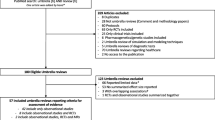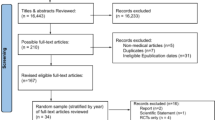Abstract
Purpose
Although cohorts of health professionals are not representative of the general US population, the generalizability of exposure–disease relationships identified in these cohorts has not been extensively evaluated. Our objective was to compare the associations of risk factors with cancer risk obtained in the Nurses’ Health Study (NHS), Nurses’ Health Study II (NHSII), and the Health Professionals Follow-Up Study (HPFS) with those from meta-analyses of cohort studies.
Methods
Data were extracted from the most recent systematic literature reviews conducted by the World Cancer Fund/American Institute of Cancer Research (WCRF/AICR). We examined risk factors with “convincing,” “probable,” or “limited-suggestive” evidence for 17 cancer types. Cohort-specific results for NHS, NHSII, and HPFS and corresponding sex-specific pooled meta-analysis results were obtained when available. We compared associations for continuous variables and inspected potential non-linearity in the dose–response meta-analyses.
Results
Data for 88 comparisons across 11 cancer types were available. For most risk factors, we observed a close resemblance between the cohort-specific and corresponding sex-specific pooled associations. The 45 comparisons for factors considered as “convincing” or “probable” invariably exhibited similar associations in direction and magnitude. In 44 of the 45, the 95% CI from the NHS, NHSII, or HPFS captured the pooled estimate. In the one exception, the difference was 0.01.
Conclusion
The NHS, NHSII, and HPFS studies are not representative of the general US population concerning sociodemographic and behavioral factors. However, the generalizability of the exposure-disease relationship assessed in these cohorts is not impaired by these factors.

Similar content being viewed by others
Data availability
The data that support the findings of this study are available at www.dietandcancerreport.org.
Code availability
Not applicable.
References
Bao Y, Bertoia ML, Lenart EB, Stampfer MJ, Willett WC, Speizer FE, Chavarro JE (2016) Origin, methods, and evolution of the three nurses’ health studies. Am J Public Health 106(9):1573–1581. https://doi.org/10.2105/AJPH.2016.303338
Giovannucci E, Rimm EB, Stampfer MJ, Colditz GA, Ascherio A, Willett WC (1994) Intake of fat, meat, and fiber in relation to risk of colon cancer in men. Cancer Res 54(9):2390–2397
Song M, Giovannucci E (2016) Preventable incidence and mortality of carcinoma associated with lifestyle factors among white adults in the united states. JAMA Oncol 2(9):1154–1161. https://doi.org/10.1001/jamaoncol.2016.0843
Lee DH, Keum N, Giovannucci EL (2016) Colorectal cancer epidemiology in the nurses’ health study. Am J Public Health 106(9):1599–1607. https://doi.org/10.2105/AJPH.2016.303320
World Cancer Research Fund/American Institute for Cancer Research (2018) Diet, nutrition, physical activity and cancer: a global perspective. continuous update project expert Report 2018. https://www.dietandcancerreport.org. Accessed 5 Dec 2021
Funding
Not applicable.
Author information
Authors and Affiliations
Contributions
All authors contributed to the study conception and design. Material preparation, data collection, and analysis were performed by PW and supervised by ELG. The manuscript was written and approved by all authors.
Corresponding authors
Ethics declarations
Conflict of interest
The authors have no conflicts of interest to disclose.
Ethical approval
Not applicable.
Consent to participate
Not applicable.
Consent for publication
Not applicable.
Additional information
Publisher's Note
Springer Nature remains neutral with regard to jurisdictional claims in published maps and institutional affiliations.
Supplementary Information
Below is the link to the electronic supplementary material.
Rights and permissions
Springer Nature or its licensor holds exclusive rights to this article under a publishing agreement with the author(s) or other rightsholder(s); author self-archiving of the accepted manuscript version of this article is solely governed by the terms of such publishing agreement and applicable law.
About this article
Cite this article
Wang, P., Giovannucci, E.L. Are exposure-disease relationships assessed in cohorts of health professionals generalizable?: a comparative analysis based on WCRF/AICR systematic literature reviews. Cancer Causes Control 34, 39–45 (2023). https://doi.org/10.1007/s10552-022-01633-3
Received:
Accepted:
Published:
Issue Date:
DOI: https://doi.org/10.1007/s10552-022-01633-3




